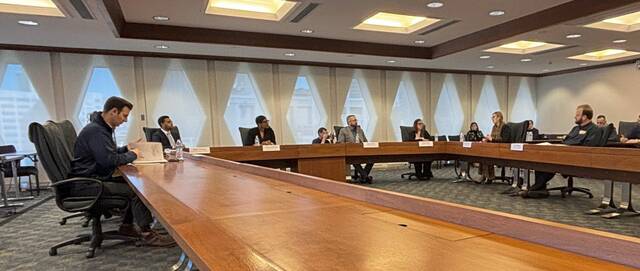Democrats and university officials say uncertainty is rampant after proposed cuts to the National Institutes of Health, and fear the move could cost the region thousands of jobs and hundreds of millions of dollars.
About 21,000 jobs are supported by NIH funding in the state, according to figures cited by U.S. Rep. Chris Deluzio, D-Fox Chapel.
Last year, the state received $2.2 billion in funding from the agency to conduct biomedical research, with the University of Pittsburgh collecting $632 million of that. Another $38 million went to Carnegie Mellon University.
“This is one of those things that we need to penetrate into the public consciousness,” said U.S. Rep. Summer Lee, D-Swissvale. “In Pennsylvania, NIH funding is massive.”
The comments were made Monday during a roundtable discussion on the cuts hosted by the United Steelworkers union, which represents faculty, staff and graduate workers at Pitt.
No Republican lawmakers took part in the meeting.
President Donald Trump, though so far stymied by federal judges, wants to cut NIH funding and impose a 15% cap on the amount of federal research funding that can be used to cover overhead expenses, such as utilities, equipment and support staff.
Courts have temporarily blocked his plan to freeze funding and strip research groups of hundreds of millions of dollars for the so-called indirect expenses of studying areas like Alzheimer’s, cancer and other deadly illnesses.
The administration essentially circumvented the court orders, however, by stopping the NIH from posting any new notices in the Federal Register, a requirement for many of the meetings required to award grants. That has since been relaxed to a partial ban, restarting the initial stages of grant applications for the world’s largest public funder of biomedical research.
Pitt researchers say they have little clarity on what might get funded, or even when money awarded to them under the Biden administration might be released. Doctoral admissions at the university were briefly paused last month, displaying how uncertainty around the NIH is reverberating throughout local research institutions.
“What we’re seeing now is an attack on an entire generation of science,” said Alisa Omelchenko, a graduate worker in Pitt’s immunology department.
For Pittsburgh, Lee likened the consequences of a hamstrung NIH to the local steel industry’s collapse in the 1980s.
Republicans representing the state, which Trump carried narrowly last year, will likely find themselves in the crosshairs of any pushback to weakened research funding.
“I think one of the pressure points we can have is the understanding that Pennsylvania is not a deep red state,” Lee said.
The office of Sen. Dave McCormick, a Republican from Pittsburgh, did not immediately return a request for comment.
Attorney General Dave Sunday, who took office this year as a Republican, could also see some attention as his Democratic counterparts play an elevated role under the Trump presidency. An all-blue coalition of 22 attorney generals were behind one of the legal challenges that paused the administration’s NIH plan.
Sunday told TribLive he’s met with university leaders affected by the changes and is reviewing economic impact numbers they provided, while also relaying these concerns to McCormick and other attorneys general.
“I plan to reconvene the universities in the coming weeks to share information and perspective and to take their soundings on next steps,” he added.
Despite scoring some temporary and limited relief in the courts, lean times could be ahead for faculty and staff at local universities.
The indirect cost requirement alone could take away $200 million in expected funding to CMU and Pitt, which has warned this could obstruct or even kill off a significant amount of research, putting jobs and medical advances in jeopardy.
“The feel on my floor at the university is very somber and uncertain,” said Nicole Hays, a research operations manager at Pitt. “Nobody really knows what’s going to happen.”











